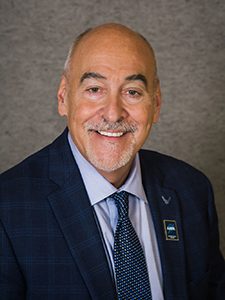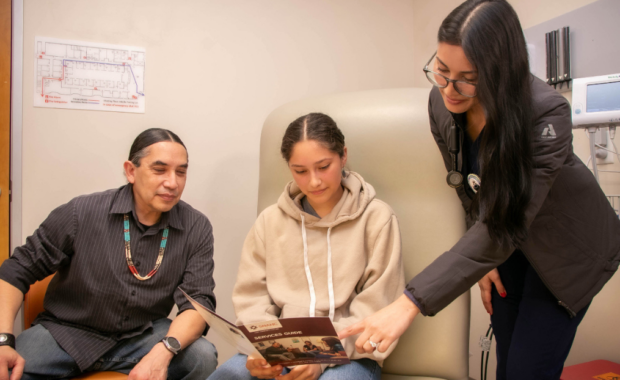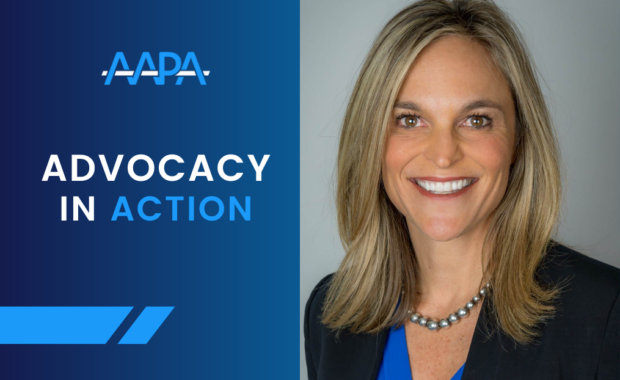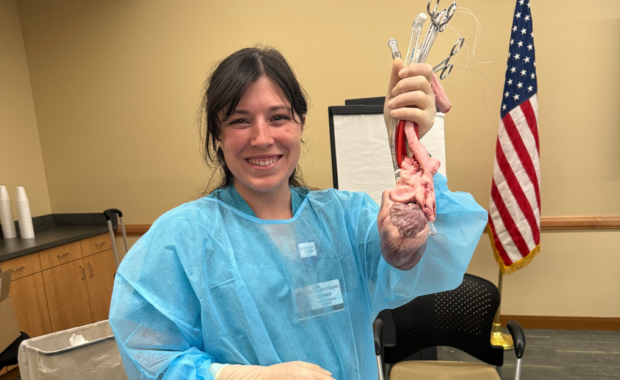AAPA Won’t Rest Until PAs are Fully Empowered to Respond to COVID-19
We’re Aggressively Working to Update Laws, Inform the Public
March 31, 2020
By David E. Mittman, PA, DFAAPA
 What is AAPA doing to respond to the COVID-19 crisis? It’s a question I’ve been asked by many of you in private conversations and emails, and that I have seen consistently on social media and on the Huddle. So, let me answer this question directly. AAPA is aggressively advocating on your behalf during this crisis.
What is AAPA doing to respond to the COVID-19 crisis? It’s a question I’ve been asked by many of you in private conversations and emails, and that I have seen consistently on social media and on the Huddle. So, let me answer this question directly. AAPA is aggressively advocating on your behalf during this crisis.
Over the last couple weeks, in collaboration with state chapters, AAPA’s work to remove supervision requirement for PAs in laws and regulations has intensified considerably. As you know, removal of supervision requirements was a goal solidified by the House of Delegates three years ago when it passed Optimal Team Practice (OTP).
COVID-19 has underscored why PAs passed this policy. During this national health crisis, policymakers and the public are recognizing the arbitrary nature of laws that require PAs to have an agreement with a specific physician in order to practice, or that require ratio restrictions. In a state where a physician is limited to “supervising” four PAs—what happens when that physician falls ill themselves? What happens when a PA who practices at a private primary care office wants to help at a hospital that is overwhelmed with COVID-19 patients, yet can’t because they don’t have a “supervising” physician credentialed at that hospital? Those policies don’t serve our patients well.
AAPA is working on both short-term and longer-range strategies to ensure PAs can fully contribute not only to COVID-19 patient needs, but to the broader healthcare system in general:
- In the short-term, AAPA is calling on governors to immediately remove supervision requirements by issuing executive orders as five states have done at this time. In fact, we issued this press release today. We continue to support our state chapters in making these requests and have prepared sample executive order language. I recently authored an op-ed that clearly presents both the urgency and argument for why this action is critical to the COVID-19 response: “More physician assistants are ready to help with COVID-19—now governors must empower them.”
- AAPA’s longer-range advocacy strategy requires permanent legislative change to the restrictive and archaic barriers that preclude PAs from delivering to patients the medical care they are trained to provide. These changes take time, and are often incremental in nature as we’ve seen in the last week with victories in Kentucky, Washington, Maine, and Iowa, to name a few.
As you know, while governors can temporarily suspend supervision requirements for PAs, only state legislatures have full control over these permanent decisions. And, while the White House and federal agencies have recommended supervision requirements be eased, they have no authority in these state decisions. Nurse practitioners have worked more than 30 years to make progress on this issue. We can build on what they have done.
Among AAPA’s immediate federal priorities are requesting that the White House remove supervision requirements for federally employed PAs, such as those who work for the U.S. Department of Veterans Affairs or the Bureau of Prisons; and, advocating for personal protection equipment for PAs, signing on to this letter to Vice President Pence along with Congressional leaders.
One of AAPA’s federal priorities became a reality on March 27 when the President signed emergency legislation, the Coronavirus Aid, Relief, and Economic Security Act or the “CARES Act” (H.R. 748) that included the Home Health Care Planning Improvement Act (S. 296/H.R. 2150). AAPA had to act swiftly to attach our legislation to this larger vehicle, which was no easy feat. AAPA worked on home healthcare for over a decade and now, PAs can finally order home healthcare services for Medicare patients, freeing up beds for potential COVID-19 patients and others, and preventing the further spread of the virus.
AAPA is also providing valuable resources to our members, whether you are on the front lines providing clinical care, an educator retooling your curriculum for e-learning, or a student adapting to online classes. You can find tools and information on AAPA’s COVID-19 Resource Page, including shareable graphics for PAs to show their professional pride and deliver an important public health message.
We are also aggressively reaching out to national, state, and local media, correcting misinformation, and raising awareness of the contributions of PAs during this national crisis. AAPA has engaged a global public relations agency to assist to specifically leverage their national media contacts.
Now, back to the crisis at hand.
Over the coming days, more and more states will likely issue executive orders removing physician supervision requirements temporarily. PAs will have the opportunity, free from burdensome administrative constraints, to prove ourselves, to fully contribute to the healthcare team and to practice according to our training, education, and experience.
This is an occasion we can all rise to—and one that will pave the way for permanent change in the very near future, once the nation experiences what PAs are truly capable of accomplishing: saving lives.
Finally, I would ask that you take a moment to tell us your story and how you’re contributing to the COVID-19 response. The more PA stories we have, the stronger case AAPA can make in our advocacy and media relations strategies. Take some pictures also (not of patients) of what you do best: contributing to the health of our nation. We will need to document this.
Also, be sure to check out this list of Frequently Asked Questions regarding the COVID-19 response and how AAPA is helping our members navigate this strange new world.
Stay healthy and safe, my friends. AAPA is by your side, and we have your back.
David E. Mittman, PA, DFAAPA, is AAPA president and chair of the Board. Contact him at [email protected].




